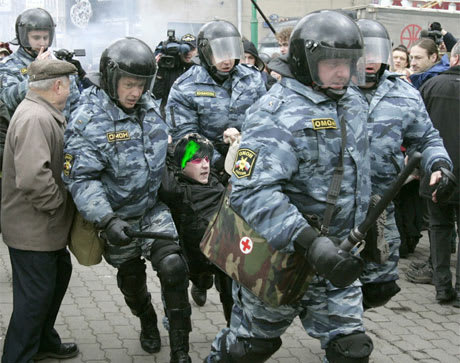Being emo these days can be tough. It can be especially difficult in certain corners of the world, like Mexico, for example, where pierced-up, massacre-sporting teens recently came face to face with beat-downs, "hunts and full-on anti-emo riots. Well, you can welcome Mother Russia to the list of nations where being emo means watch your back.
During last months State Duma, Russian politicians held a hearing on Government Strategy in the Sphere of Spiritual and Ethical Education, a piece of legislation aimed at suppressing "dangerous teen trends. In it, "emos (apparently now its a noun as well as an adjective) were high on the list of offenders, demanding tougher regulation on emo websites and banning all emo and goth fashions from schools and government buildings.
As the Guardian newspaper reported, Alexander Grishunin, one of the proposed legislations supporters, said: "The point of the bill is so that by 2020, Moscow will have someone to rule its government. This is the first step in the public discourse. He also said this with a straight face, adding that the government hoped to have the proposal pass before the end of the year.
In the bill, the authors have taken it upon themselves to describe emos to less-hip political peers, saying the typical emo is between 12-16 years old, has black and pink clothing, studded belts, painted fingernails, piercings and black hair with bangs that "cover half the face. (Apparently, if you are old school and sport star tattoos and skinny tees along with your Cap N Jazz and Braid records, you are in the clear.) The bill also described emo culture as having a "negative ideology, which may promote depression, social isolation and suicide, especially among girls.
"Of course, there are emo teens who just listen to their music. But our actions are not directed at them but rather at those who also hurt themselves, commit suicide and promote those acts," the Guardian quoted the bills co-author Igor Ponkin as saying.
And like in Mexico and the UK, emo kids arent so happy about all this marginalising, with several Russian teens speaking out against the bill and protesting in the streets.
Dozens of hair-straightened emo fans recently marched in Krasnoyarsk, Siberia, the Guardian reported, where the government is attempting to fast-track the bill. "How can you stop people from expressing themselves, from dressing how they like, from living a way of life that doesn't harm anyone?" one protester asked on Russian TV. Other protesters held signs stating slogans such as "Kill the State in Yourself" and "A Totalitarian State Encourages Stupidity."
There is no word yet on when Russian politicians will decide if the proposed anti-emo legislation will in fact become law.
During last months State Duma, Russian politicians held a hearing on Government Strategy in the Sphere of Spiritual and Ethical Education, a piece of legislation aimed at suppressing "dangerous teen trends. In it, "emos (apparently now its a noun as well as an adjective) were high on the list of offenders, demanding tougher regulation on emo websites and banning all emo and goth fashions from schools and government buildings.
As the Guardian newspaper reported, Alexander Grishunin, one of the proposed legislations supporters, said: "The point of the bill is so that by 2020, Moscow will have someone to rule its government. This is the first step in the public discourse. He also said this with a straight face, adding that the government hoped to have the proposal pass before the end of the year.
In the bill, the authors have taken it upon themselves to describe emos to less-hip political peers, saying the typical emo is between 12-16 years old, has black and pink clothing, studded belts, painted fingernails, piercings and black hair with bangs that "cover half the face. (Apparently, if you are old school and sport star tattoos and skinny tees along with your Cap N Jazz and Braid records, you are in the clear.) The bill also described emo culture as having a "negative ideology, which may promote depression, social isolation and suicide, especially among girls.
"Of course, there are emo teens who just listen to their music. But our actions are not directed at them but rather at those who also hurt themselves, commit suicide and promote those acts," the Guardian quoted the bills co-author Igor Ponkin as saying.
And like in Mexico and the UK, emo kids arent so happy about all this marginalising, with several Russian teens speaking out against the bill and protesting in the streets.
Dozens of hair-straightened emo fans recently marched in Krasnoyarsk, Siberia, the Guardian reported, where the government is attempting to fast-track the bill. "How can you stop people from expressing themselves, from dressing how they like, from living a way of life that doesn't harm anyone?" one protester asked on Russian TV. Other protesters held signs stating slogans such as "Kill the State in Yourself" and "A Totalitarian State Encourages Stupidity."
There is no word yet on when Russian politicians will decide if the proposed anti-emo legislation will in fact become law.
